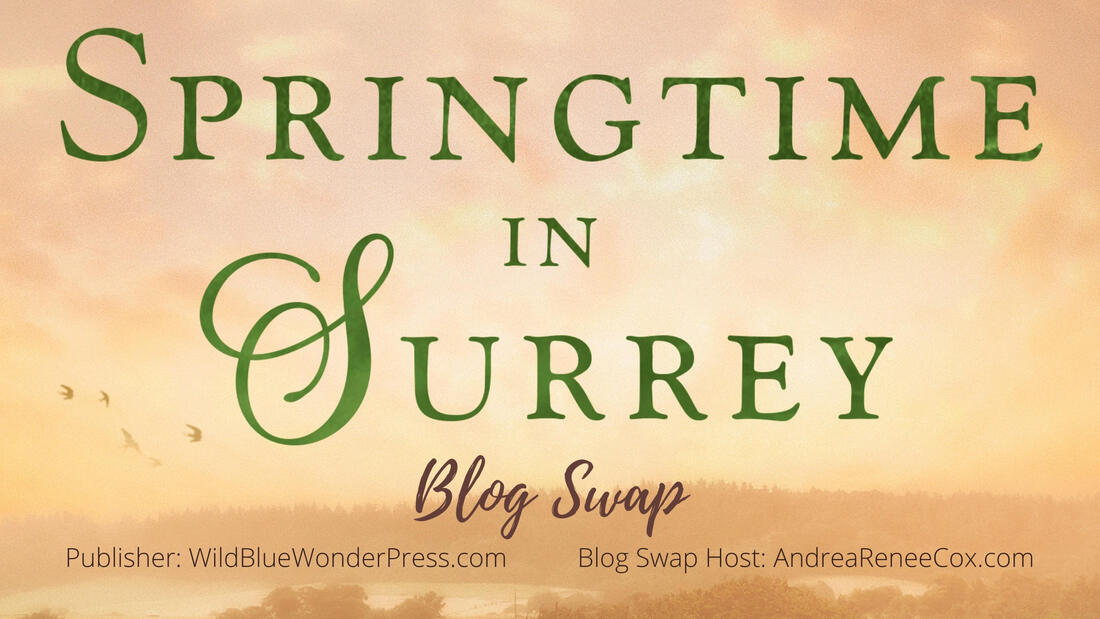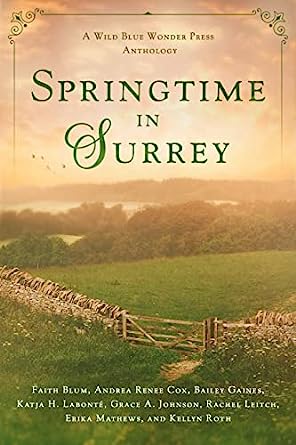|
Welcome back to the Springtime in Surrey blog tour! Today, Katja H. Labonté, author of The Tussie-Mussie, shares the top five writing mistakes she's made, according to Strunk and White. I had the privilege of helping edit her beautiful novella and am eager to learn what has helped her develop her unique and striking writing voice. If you know me at all, you know I am a huge follower of Basic Principles of Speech by Lew Sarrett & William Trufant Foster. It’s my top favourite book, I quote it in season and out of season, and I’m always rereading it and discovering again—or for the first time!—the amazing principles it has for life and writing. My second favourite writing resource book is The Elements of Style by E.B. White & William Strunk Jr. They are my writing guardians and I swear by them. (And I hope you’ll go look them up and read them when you’re done this blog post.) I usually reread these books every year so they stay fresh in my mind. However . . . last year I failed to read Basic Principles of Speech. *hides* And I have read neither of these books (nor my third favourite writing resource book, Joseph M. Williams’ Style) yet this year. So when writing my newest story, a novella called “The Tussie-Mussie” for the Springtime in Surrey anthology . . . I may have ignored the sage advice of my writing guardians. With disastrous results. And so here I am, sharing my mistakes so you don’t have to make them. I present to you My Top 5 Writing Mistakes According to Strunk & White. 1. NEVER flaunt your vocabulary. I don’t like admitting it, because I one hundred percent know better. (How many times does BPOS talk about this?) But in my prologue for “The Tussie-Mussie”, I chose to flaunt my vocabulary and use as many grandiose words as possible… merged with a very complex writing style. It read like a miserable attempt to copy about five different Victorian authors at once, with a salty spoonful of modern voice. I was thoroughly ashamed of it, and the prologue is not part of the published story, so don’t go looking for it. But anyways . . . I am cured. If a big word happens to describe exactly what I want, and it came naturally to me, I’ll use it. But I will not go “crowding in all the fine big words I could think of,” à la Anne Shirley. “Avoid fancy words. Avoid the elaborate, the pretentious, the coy, and the cute. Do not be tempted by a twenty-dollar word when there is a ten-center handy, ready and able…. If you admire fancy words, if every sky is beauteous, every blonde curvaceous, every intelligent child prodigious, if you are tickled by discombobulate, you will have a bad time with Reminder 14. What is wrong, you ask, with beauteous? No one knows, for sure. There is nothing wrong, really, with any word—all are good, but some are better than others.” (The Elements of Style, Chapter 5, reminder 14) 2. Rewriting is okay. I’ve said that over and over to others, but it’s still hard for me to admit to myself. In this novella, I had to rewrite the beginning and large sections throughout because they just weren’t any good. It was hard to remind myself it was okay. It’s good. It’s necessary. It’s the smart/right thing to do. All the best authors did it. There is NO shame in it. It’s natural. “Revising is part of writing. Few writers are so expert that they can produce what they are after on the first try…. [I]t is no sign of weakness or defeat that your manuscript ends up in need of major surgery.” (The Elements of Style, Chapter 5, reminder 5) 3. Don’t overwrite. I am deeply guilty of that, and it’s the hardest thing for me to fix, because it is so natural. I have to rely on others to point out things that are unnecessary, because I just don’t register it. But it’s something I must work on. Stop cramming in all the adjectives and adverbs. All the dialogue tags. All the poorly written and useless description. Will I still use adverbs, adjectives, and dialogue tags? Yes. My favourite writing styles use them. I am allowed to copy what I love. But moderation is the key, and unless you’re a genius, it’s better to err on the side of less than more. “Omit needless words. Vigorous writing is concise. A sentence should contain no unnecessary words, a paragraph no unnecessary sentences, for the same reason that a drawing should have no unnecessary lines and a machine no unnecessary parts. This requires not that the writer make all sentences short, or avoid all detail and treat subjects only in outline, but that every word tell.” (The Elements of Style, Chapter 2, Rule 17) 4. Be clear. I thought I was good at that. After all, I’m the girl whose top writing tip is “write exactly what you mean, as briefly as you can” and who produced a whole blog post about writing clearly. But I easily fall into the trap of using words or metaphors that are muddy or too subtle. Again, it’s hard for me to catch this myself. But by dint of careful attention, I can definitely improve. I definitely need to go back to talking my time in writing and making sure I am saying exactly what I want to say, and in the best, clearest way possible. “Clarity is not the prize in writing, nor is it always the principal mark of a good style. There are occasions when obscurity serves a literary yearning, if not a literary purpose, and there are writers whose mien is more overcast than clear. But since writing is communication, clarity can only be a virtue. And although there is no substitute for merit in writing, clarity comes closest to being one.” (The Elements of Style, Chapter 5, reminder 17) 5. My writing can always get better. I didn’t realize how proud and complacent I was about my writing until I wrote this story. It’s so embarrassing to admit, but I was convinced I was experienced enough to be a pro and didn’t need to change anything. I thought I knew it all. LIES. I can always get better. I’m not perfect. I need to get better. But I will never get better if I don’t remember that. At the same time, my writing is legit. I can always get better, yes. I have flaws and familiar trap holes, yes. But I am also allowed to be myself. I need to be myself. I can write the way that feels natural to me. My writing style won’t match others’ and they might not like it—and that’s okay, for both of us. We don’t have to match, we don’t have to have the same taste. There are guidelines and rules to follow, but there is also freedom be uniquely ME. And I’m good enough as me. But there are rules for a reason. In short, I’ve learned I know only about half as much as I thought I did, and I need to study more. I need to work more. And I discovered that humility is what makes a great author. The willingness to refine and work over and over on his story. The willingness to study and hone his craft. The willingness to realize he can always be better, and he will never get perfect or plateau. You can’t become a master if you’re a puffy head who thinks you've got it all. A real master knows how much greater he could be, because he has seen so much more perfection. There’s no room for pride in good writing, because good writing isn’t about “I”, and prIde is just that—all about i. “It is an old observation that the best writers sometimes disregard the rules of rhetoric. When they do so, however, the reader will usually find in the sentence some compensating merit, attained at the cost of the violation. Unless he is certain of doing as well, he will probably do best to follow the rules.” (The Elements of Style, Introduction) So, friends, happy writing trails to you. May your pens never be inkless, nor your hands cramped; may Strunk and White watch over you; and may you never discover the pitfalls I stumbled into.
Come back next Wednesday to hear from another Springtime in Surrey author about how an anonymous poem inspired her historical fiction novella, on the last stop of our blog swap.
2 Comments
Andrea Renee Cox
7/27/2023 07:17:51 pm
Fantastic article!
Reply
Rachel Leitch
8/18/2023 04:44:21 am
I know! Such good tips, considered from a perspective I might not have arrived at on my own. I appreciated her transparency in sharing her mistakes with us.
Reply
Leave a Reply. |
Author
Hi, I'm Rachel! I'm the author of the posts here at ProseWorthy. Thanks for stopping by! Archives
June 2024
Categories
All
|



